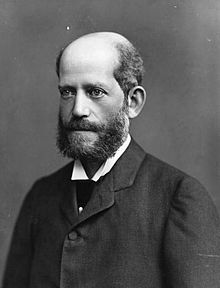Ferdinand de Rothschild
Baron Ferdinand de Rothschild | |
|---|---|
 | |
| Member of Parliament for Aylesbury | |
| In office 18 July 1885 – 17 December 1898 | |
| Preceded by | Nathan Rothschild |
| Succeeded by | Walter Rothschild |
| Personal details | |
| Born | 17 December 1839 Paris, France |
| Died | 17 December 1898 (aged 59) Waddesdon Manor, Buckinghamshire, England |
| Nationality | British |
| Spouse | |
| Occupation | Banker |
Life and career
Although Ferdinand de Rothschild was born in Paris in 1839, he was from Vienna and was a member of the Rothschild banking family of Austria. He was the second son of Anselm Salomon Freiherr von Rothschild (1803–1874), a Vienna-based banker, and his English wife Charlotte Nathan Rothschild (1807–1859), daughter of Nathan Mayer Rothschild.[2] Ferdinand's great-grandfather was Mayer Amschel Rothschild.
Although possessing the hereditary title of
From 1868 to 1875, he became Treasurer of the Jewish Board of Guardians and Warden of the Central Synagogue in 1870.[4] During these roles, Ferdinand instigated an offer of £2,000 which ultimately led to the foundation of the Army Reservists' Home.[5]
In 1883, Ferdinand de Rothschild was
From 1896, he was a Trustee of the British Museum, a role suggested by Sir Augustus Wollaston Franks[8] and which led to his Renaissance collection being bequeathed to the British Museum after his death. This is now exhibited as the Waddesdon Bequest.
Ferdinand de Rothschild died at Waddesdon Manor on his 59th birthday, thought to be the result of a cold caught when last visiting his wife's tomb.
Collecting

Fluent in three languages, and considered "as much at home in Paris as in London",[3] Ferdinand was an already inspired collector of eighteenth-century French decorative arts from his early twenties. For instance, when he was only 21 years old, his first purchase was made of one of the most ostentatious rococo Sèvres ship vases from the Louis XV era. His development into one of the most renowned collectors of the 19th century, even amongst the Rothschilds, is known by the abundance of family letters in which he is referred to as "curiosity-hunting... all over Europe".[3]
In the autumn of 1874, Ferdinand de Rothschild bought land in the village of
His collection of
References
- ^ a b Roth, Cecil (1939). The Magnificent Rothschilds. Robert Hale. p. 197.
- ^ a b House of Commons and the Judicial Bench 1886
- ^ OCLC 695587648.
- ^ The Magnificent Rothschilds. p. 198.
- ^ The Magnificent Rothschilds. p. 197.
- ^ Leigh Rayment's Historical List of MPs – Constituencies beginning with "A" (part 3)
- ^ Thornton (2015), 18-19, 53-54
- ^ The Magnificent Rothschilds. p. 192.
- ^ Seccombe 1901.
- ^ Schwartz, Selma (2000). Waddesdon: The Rothschild Collection Guide. National Trust Charity. p. 4.
- ^ Hall, Michael (2002). Waddesdon: The Biography of a Rothschild House. New York: Harry N. Abrams. p. 15.
- ^ Baron Ferdinand de Rothschild, The Red Book (1897: Waddesdon Archives).
Sources
- Seccombe, Thomas (1901). . In Lee, Sidney (ed.). Dictionary of National Biography (1st supplement). London: Smith, Elder & Co.
- Davis, R. W. (2004). "Ferdinand James von Rothschild". Oxford Dictionary of National Biography. required.)
- Mrs James de Rothschild - Rothschilds at Waddesdon Manor (Collins, 1979) ISBN 0-00-216671-2
- Thornton, Dora (2015), A Rothschild Renaissance: The Waddesdon Bequest, 2015, British Museum Press, ISBN 978-0-7141-2345-5
